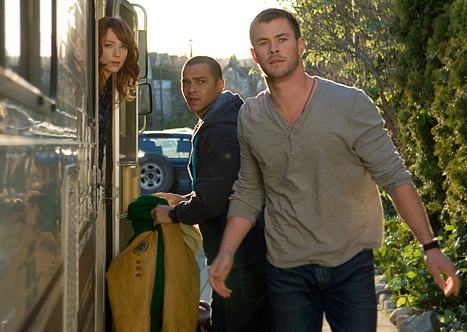There’s been a bit of a to-do online about spoilers in negative reviews of The Cabin In The Woods, which are really pretty awful and miss the point of the movie pretty completely. There’s also been a bit of minor tut-tutting about spoilers in the movie’s trailer itself, but considering the “spoiler-y” bits from the trailer are addressed in the movie’s first shot, they’re not that bad (though I’m still not going to specify what I’m talking about).
Speaking as someone who’s been read the riot act on occasion for saying “too much” in the past, I do think that sometimes people overreact about spoilers, but since, as the poet said, every action has an equal and opposite reaction, just as often people overreact in the opposite way and spoil things out of spite, which is how Rex Reed’s New York Observer review of The Cabin In The Woods comes across (though, of course, speculating on another’s motives is folly, especially when that other is Rex Reed). That’s particularly unfortunate in the specific case of The Cabin In The Woods, because it’s a pretty marvelously constructed genre/meta-genre piece whose entertainment value rests specifically derives from not knowing what’s going to happen next.
So I won’t specifically discuss any of the plot here. Even talking about what you think you know from the trailer is either misleading or reductive. And, at the same time, not. Joss Whedon and longtime collaborator Drew Goddard (they co-wrote, and Goddard directed) know their horror and SF inside and out. Both have also frequently demonstrated—together on Buffy and Angel and separately elsewhere—an ability to create and sustain compelling, sympathetic characters, which is of greater importance to making The Cabin In The Woods the entertaining and frankly exhilarating movie it is. Considering that so much of the movie is a metacinematic critique of genre tropes, it would be easy for it to become excessively dry and cerebral. Considering that character archetypes and even stereotypes are part of that critique, the movie’s characters also have to be archetypal and yet not stereotypical, a tremendously difficult balancing act that Whedon and Goddard pull off, for the most part, spectacularly well here.
The need to avoid spoilers at all costs here is a bit frustrating, because I want to talk about how even the bad guys have the writers’ empathy, and are the easiest characters to whom audiences can connect, as they are us, and part of a broader bit of social commentary about pop culture voyeurism. But saying who those bad guys are is a spoiler, and calling them bad guys is a slight oversimplification. Arrrgh! See how frustrating this is?
Basically, what I’m saying is, if you like SF, horror, and Joss Whedon’s particular brand of both, The Cabin In The Woods is essential. It works on both the intellectual and gut level at the same time and reciprocally, in a neat trick. It begins with a surprise. It ends pretty much the way I’ve always wanted to see a horror picture end. And in between is a lot of skillfully executed horror, all the more for the fact that it’s effective as horror even though we’re all thinking about it being horror and what it means that we’re watching it. If that sounds like a lot to deal with, maybe it is. But it’s worth it if you have any kind of love for genre and genre movies. Go see it quick so we can talk about it with proper nouns.
Danny Bowes is a New York City-based film critic and blogger.










